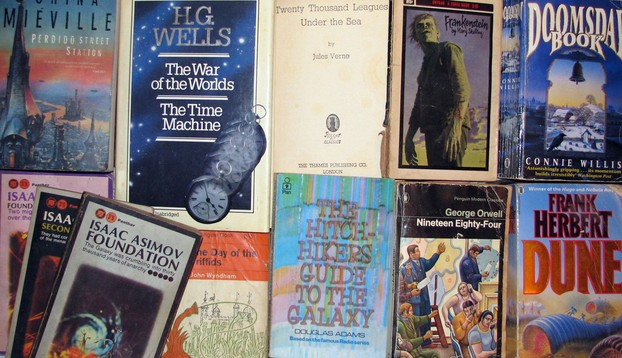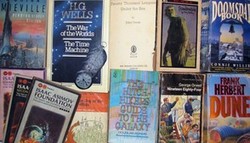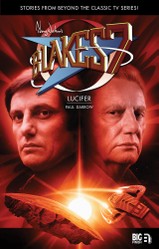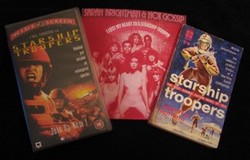Science fiction has become one of the most popular genres in publishing and over the years there have been many thousands of books published, ranging from the very poor to brilliant pieces of literature. Here, Steve Rogerson takes on the impossible task of choosing ten novels that stand out from the rest.

Ten of the Best Science Fiction Novels of All Time
Contenders for the title of best science-fiction novel of all time.
 Some of the best science-fiction books of all time |
Readers of science-fiction novels fall into many camps. Some prefer books with a strong scientific base, others liked to be wowed by an author’s imagination whether or not the worlds and people being described have a realistic technological chance of developing. Some prefer the political aspects to be a driving force, some like a fantasy element. Alternative histories and alternative worlds also fall into the science fiction camp.
Thus, to pick ten books that are the best science fiction novels of all time is a difficult if not impossible task and one that will de disagreed with by just about everyone. As such, the ten books listed here have been chosen because they are in some ways milestones in science-fiction, from Mary Shelley’s Frankenstein, regarded by many as the first modern science-fiction novel, through classics such as The Time Machine and Nineteen Eighty-Four to the more modern Doomsday Book and Perdido Street Station.
At the end is a list of books that were considered for the list and did not quite make it. For those who have their own ideas about what should and should not be included, please use the comments box to put forward other suggestions. The books in the main section are listed alphabetically.
A Journey to the Centre of the Earth, by Jules Verne (1864)
This book has spawned numerous films and television series and tells the story of a professor who leads a quest to the centre of the earth encountering various difficulties on the way. Despite many of his predictions of what lies beneath the surface the earth now known to be wrong, it still survives as an entertaining story for young and old alike.
Day of the Triffids, by John Wyndham (1951)
Television, films and even comics have retold the story many times but none did it better than the original novel about the strange walking plants with their deadly sting that become dominant after most humans are blinded following a meteor shower. Bill Masen survives the blindness, as he was in hospital at the time, and leads the fight back.
Doomsday Book, by Connie Willis (1992)
Oxford University is the setting for this time travel book in which historians travel back in time as part of their research. Kirvin Engle uses the time machine to go back to 1320 and is taken ill and cannot recall where she has to go to return to her own time. Meanwhile, in the present a flu epidemic is taking place. It is also discovered that a mistake has sent her to 1348 and not 1320 and she is there during the Black Death epidemic. It won the Hugo and Nebula awards.
Dune, by Frank Herbert (1965)
Another Hugo and Nebula winning novel, Dune is set on a desert planet that is the source of melange, a valuable spice. The Duke of Atreides has been put in charge of the planet, where water is extremely scarce. The story looks at both the political manoeuvrings of the various ruling families and at the ambitions of the planet’s native population.
Foundation Trilogy, by Isaac Asimov (1951)
Though there are now seven novels in the Foundation series, the place in this list goes just to the original trilogy of Foundation, Foundation and Empire and Second Foundation published between 1951 and 1953. They are, in fact, a collection of short stories originally published in Astounding in the 1940s. They tell the story of Harry Seldon’s plan to bring the universe out of barbarism.
Frankenstein, by Mary Shelley (1818)
Subtitled The Modern Prometheus, this tells the story of Victor Frankenstein who builds a man out of bits of body parts and is then horrified by what he has created and leaves the monster to its own devices. But when the monster kills his brother, Frankenstein realises he needs to act. The monster’s telling of his observations of humans is one of the best parts. There have been many films either of the novel itself or featuring Frankenstein’s monster.
Nineteen Eighty-Four, by George Orwell (1949)
A dystopian futuristic society sees the public subjected to constant surveillance and control. News is managed and manipulated and history altered to suit current thinking. The book tells the story of Winston Smith, who tries in his own way to rebel against the society.
Perdido Street Station, by China Miéville (2000)
This was the first book China Miéville set in the gorgeous and dangerous world of Bas-Lag and the city of New Crobuzon where Isaac Dan der Grimnebulin is given the task of restoring the wings of a criminal who had them removed as punishment. During his research, he accidentally triggers the metamorphosis of a caterpillar into a deadly slake-moth that takes people’s dreams and leaves them brain dead. When the moth frees more of its kind, the city has serious problems.
The Hitchhiker’s Guide to the Galaxy, by Douglas Adams (1979)
What started life as a 1970s BBC comedy radio series grew into a plethora of novels, TV shows, film, comics and stage show. Douglas Adams wrote five novels in the series before his death in 2001 and a sixth novel was later penned by Eoin Colfer and released in 2009. The first book starts with the end of the world and a man called Arthur Dent, rescued by an inter-planetary hitchhiker called Ford Prefect, who is also the researcher for The Hitchhiker’s Guide to the Galaxy.
The Time Machine, by HG Wells (1895)
The book that brought the phrase “time machine” into the English language tells the story of an English inventor who uses his machine to travel forward in time where he encounters two species, the Eloi and the Morlocks, and speculates about the relationship between the two. There have been various film, TV and radio adaptations, one of the best being 1976’s The Space Machine by Christopher Priest, which also acts as a prequel to another famous HG Wells book The War of the Worlds.
Some Other Great Science Fiction Books
There are loads of books that could have made this list but did not. Arthur C Clarke’s 2001: A Space Odyssey was very hard to leave out, as was Fahrenheit 451 by Ray Bradbury and Stranger in a Strange Land by Robert Heinlein. Some authors could easily have had more than one book in the list – Isaac Asimov, HG Wells and Jules Verne all had other contenders.
Philip K Dick wrote some great novels and as a collection of stories would deserve a place but none individually stood out enough to sneak in. Other possibilities include The Silver Metal Lover by Tanith Lee, The Postman by David Brin, Ringworld by Larry Niven, Player of Games by Iain M Banks, Voyage by Stephen Baxter and Desolation Road by Ian McDonald.
You might also like
Book Review: Lucifer by Paul DarrowA review by Steve Rogerson of Lucifer, a Blake's 7 novel written by Paul Darrow.
Starship Troopers: The Book, the Film and the SongHow you can lose your heart to Starship Troopers, in book, film and song






 KZine Issue 31: Review of October 2021 Issueon 11/07/2021
KZine Issue 31: Review of October 2021 Issueon 11/07/2021
 KZine Issue 30: Review of June 2021 Issueon 07/05/2021
KZine Issue 30: Review of June 2021 Issueon 07/05/2021
 KZine Issue 29: Review of February 2021 Issueon 02/23/2021
KZine Issue 29: Review of February 2021 Issueon 02/23/2021
 KZine Issue 28: Review of September 2020 Issueon 10/01/2020
KZine Issue 28: Review of September 2020 Issueon 10/01/2020



Comments
SteveRogerson, Thank you for practical information, pretty pictures and product lines.
In particular, I appreciate the Foundation series by Isaac Azimov.
What would you think of putting Yevgeny Zamyatin's We in the top 10?